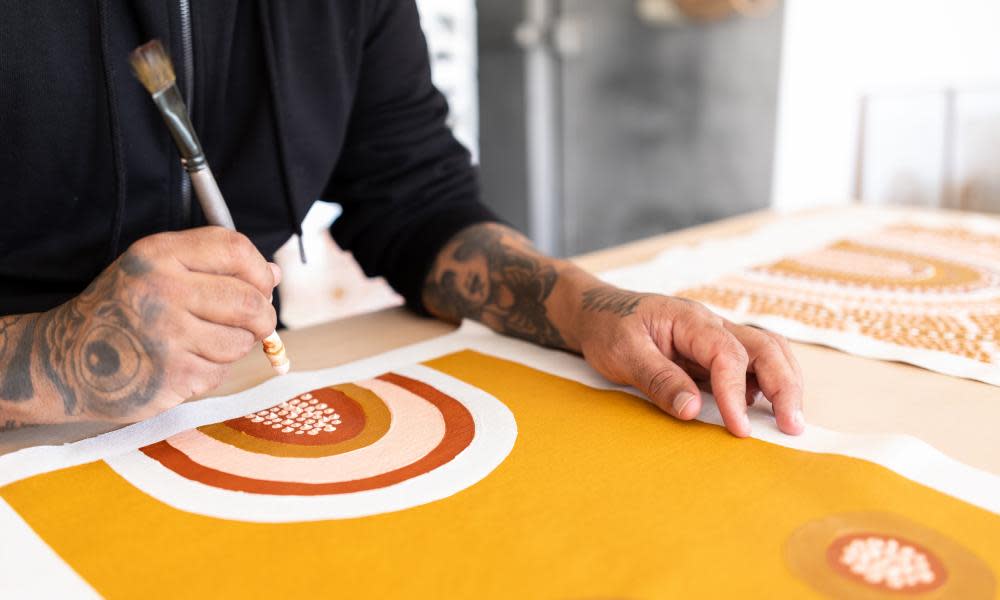Music, literature and First Nations at the forefront of a $300m boost to the arts, Labor to announce

The federal government’s 48-year-old arts funding and advisory body will get a $200m funding boost and a new name in the Labor government’s overhaul of Australia’s arts and culture sectors.
The Australia Council for the Arts will be rebranded Creative Australia and will take two-thirds of almost $300m that the Albanese government is promising to inject back into arts, entertainment and culture over the next four years.
Related: Labor to impose streaming content quotas and boost funding for writers and musicians
It follows more than a decade of stagnant and, in many cases, significantly declining recurrent funding – notwithstanding the $200m Rise program that the Morrison government committed to avert total industry collapse during Covid-19.
The new National Cultural Policy, which will be called Revive and is due to be officially launched on Monday, was promised by the now arts minister, Tony Burke, ahead of the federal election last May, though without any pre-election details or dollar figures.
The policy will establish two new entities to cover music and literature, two areas perceived to have been disproportionately neglected under the previous government. It will also feature measures to place First Nations work and artists at the forefront.
A dedicated new body, Music Australia, will support and invest in the development of Australian contemporary music.
Literature will operate under a new support and investment body, Writers Australia, details of which are expected to be outlined at Monday’s policy launch. The sector learned on Friday that authors would begin receiving lending rights from audio and ebook loans for the first time under Revive, a move which is expected to boost writer earnings by as much as 20%.
Labor is promising to introduce legislation to protect First Nations’ knowledge and cultural expressions, with a particular brief on cracking down on fake art, and establish a new Indigenous-led body that Burke said will give First Nations people autonomy over investments and decisions, including how a new creative workforce strategy should be developed.
Funding of $11m will establish a policy partnership with the Australian government to steer the future direction of First Nations languages. There will be $80m towards building a National Aboriginal art gallery in Alice Springs (a project announced in last year’s budget that the Northern Territory government has already committed to), as well as an unspecified amount for an Aboriginal cultural centre in Perth.
And in a move first flagged by Burke in July to address concerns of harassment and discrimination, primarily in the music industry, the entire government-funded arts sector will be subject to fair pay and workplace safety measures overseen by a newly formed group, the Centre for Arts and Entertainment Workplaces.
With the above exceptions, Monday’s announcement of Revive is expected to be light on fiscal detail, with much of the finer detail not expected until the May budget. Australia’s major collecting institutions already know they will have to wait a further four months to learn of their fate, with many saying they have been on a financial knife’s edge for years.
The screen industry, and in particular the previous government’s commitment to a further $400m over the next four years to attract large overseas film productions to Australia through its Location Incentive scheme, is also not expected to be part of Monday’s policy announcement.
Labor has, however, committed to a timeline for the introduction of quotas to force streaming companies such as Netflix, Disney, Amazon and Apple TV to spend a minimum percentage on distinctly Australian content.
The industry has been pushing for streaming platforms to be forced to spend 20% of their Australian revenue on locally made content, but no figure will be revealed yet. A Labor spokesperson said consultation over the next six months would determine the final percentage, which would be legislated by the end of the year and come into effect on 1 July 2024.
In a statement released on Sunday, the prime minister, Anthony Albanese, said the government’s cultural policy would bring “drive, direction and vision” back to a $17bn industry that employs around 400,000 Australians after a “lost decade” of federal policy drift and funding neglect.
“Today we start a new chapter in Australia’s art and culture sector,” he said.
“It builds on the proud legacies of earlier Labor governments that recognised the importance of art and culture to Australia’s identity, social unity and economic prosperity.”

 Yahoo Movies
Yahoo Movies 
